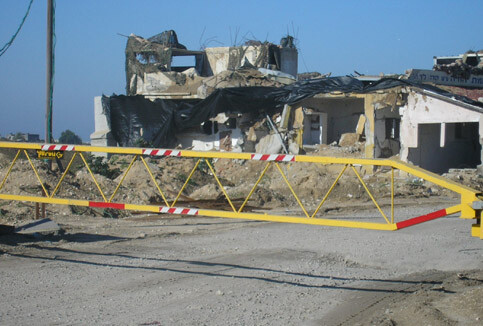Palestinian Center for Human Rights 15 January 2005

Israeli forces have continued to impose severe restrictions on the movement of Palestinian civilians through al-Matahen and Abu Houli checkpoints on the main road between the north and south of the Gaza Strip. (Arjan El Fassed)
The Palestinian Center for Human Rights is gravely concerned at the closure of al-Mentar (Karni) crossing, east of Gaza City, by Israeli occupation forces (IOF), under which the flow of goods, medicines and other supplies out and into the Gaza Strip is totally prohibited. It is worth noting that al-Mentar crossing is the only commercial outlet for the Gaza Strip to the West Bank, Israel and the outside world. Subsequently, PCHR calls upon the international community and humanitarian organizations to immediately intervene and pressure IOF to stop this systematic policy of collective punishment against Palestinian civilians.
On Friday, 14 January 2005, IOF closed al-Mentar crossing following an armed attack against a number of Israeli soldiers near the crossing on Thursday evening, 13 January 2005. Thus, IOF have completed the cycle of economic and social stranglehold of the Gaza Strip, as all border crossings, especially Rafah International Crossing Point on the Egyptian border and Erez crossing, have been closed for a long time, contrary to an Israeli official claim that these crossings were closed following the aforementioned armed attack.
Rafah International Crossing Point on the Egyptian border, the only outlet for the Gaza Strip to the outside world, has been closed by IOF since 13 December 2004. Subsequently, thousands of Palestinian civilians have been waiting at the Egyptian side of the crossing point waiting to be allowed to travel back to the Gaza Strip. These civilians, including children, women and elderly people, lack basic humanitarian needs as some of them are patients and others had expended their money during this long period of closure. Under this closure, IOF have prevented Palestinian patients who are badly in need for medical treatment abroad from traveling through the crossing point, in violation of their health rights.
Erez crossing has been closed for six months. A small number of patients who suffer from serious diseases have been allowed to travel to Israel through the crossing, but following coordination and under severe humanitarian conditions. On 11 January 2005, IOF reopened the crossing for dozens of traders, agricultural workers and patients. IOF also allow diplomats and foreigners to travel through the crossing.
IOF have continued to impose severe restrictions on the movement of Palestinian civilians through al-Matahen and Abu Houli checkpoints on Salah al-Din Street (the main road between the north and south of the Gaza Strip). On Friday, 11 January 2005, IOF decided to decrease the time of opening the two checkpoints to be from 08:00 to 15:00, after it was from 05:00 to 20:00. IOF often close the two checkpoints, check Palestinian civilians and arrest some of them.
Under the closure of al-Mentar crossing, all commercial transactions of the Gaza Strip through the crossing are totally prohibited, which will inevitably cause further deterioration of economic conditions in the Gaza Strip. Also as a result of this closure, the Gaza Strip will suffer shortages of basic foodstuffs, medicines and fuels, especially diesel which is used in generating electricity, which is in turn used in operating wells that provide water for home uses.
At times of partial closure, al-Mentar had been operated in nearly 20% of its normal capacity. IOF had imposed severe restrictions on the flow of goods through the crossing, which had resulted in damage for some goods, especially foodstuffs and medicines.
PCHR believes that these latest measures constitute forms of collective punishment that has been systematically practiced by IOF. PCHR asserts that the Israeli official claims that border crossings of the Gaza Strip were closed following an armed attack near al-Mentar crossing are false, as most border crossings of the Gaza Strip had been closed before that attack. PCHR draws the attention of the international community that these latest measures by IOF violate the word and spirit of international humanitarian law. Consequently, PCHR calls upon the international community and humanitarian organizations to pressure the Israeli belligerent occupation government to comply with its obligations under the Fourth Geneva Convention of 1949 Relative to the Protection of Civilian Persons in Time of War.
Related Links